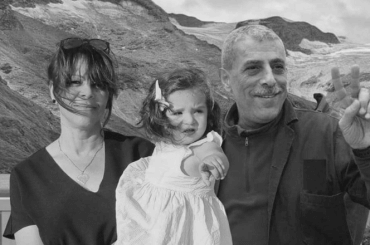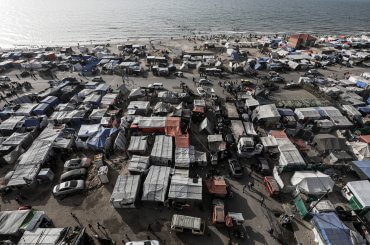AGAINST THE LOVELESS WORLD
a novel
By Susan Abulhawa
384 pp. Atria Books $27
National liberation struggles have thrown up galleries of male heroes we often come to understand as their embodiment: Ho Chi Minh, Che Guevara, Patrica Lumumba. To the distant observer, this is true of the Palestinian liberation struggle, where with the notable exception of Leila Khalid, the face of resistance is generally wearing pants.
Susan Abulhawa subverts these commonplaces in her exceptional new novel Against the Loveless World. The revolutionary Palestinian hero of Abulhawa’s novel is both a woman and a one-time sex worker whose revolutionary consciousness emerges not from the barrel of a gun but within an inferno of colonial sexism, patriarchy, homophobia and male violence. The book explores post-Nakba Palestinian history as a continual struggle for women—and to a lesser extent Queer Palestinians—to take and make their place in revolutionary history.
Abulhawa’s novel is set against the backdrop of crucial events in contemporary Palestine: the 1948 Nakba; Saddam Hussein’s invasion of Kuwait in 1990; the Oslo Accords of 1993; and the first and second Intifadas. Yet Abulhawa strategically backgrounds History with a capital H to foreground the intimate, gendered sphere of Nahr’s revolutionary awakening.
This awakening begins with her father. Separated from his family by the 1967 Israeli war, he takes up with various women she never knows and names Nahr for one of them. Displaced and dispossessed herself in Kuwait, Nahr ends up a dancer and sex worker both to stay alive and to raise money to put her brother, Jehad, through University. She is sexually assaulted on the job by a group of men the night that Hussein invades Kuwait.
Yet Um Buraq, the woman, who recruits Nahr into sex work, also becomes her protector, provider and political tutor. They meet after Nahr’s abusive marriage to Mhammad Jalal AbuJamal, a legendary rebel figure who initially puts stars in Nahr’s eyes. Um Buraq, herself abandoned, loves Nahr, but tells her never to trust men. “Until I met Um Buraq,” she thinks, “it had never occurred to me that patriarchy was anything but the natural order of life. She was the first woman I met who truly hated men. She said it openly and without apology. I found her persuasive.”
Nahr moves quickly to reinterpret events of her life. She comes to hate Mhammad, and the men who have abused and exploited her. She denounces marriage. She begins to reassess the lives of her mother and grandmother as survivors of two oppressive histories: as women, as Palestinians.
The revolutionary Palestinian hero of Abulhawa’s novel is both a woman and a one-time sex worker whose revolutionary consciousness emerges not from the barrel of a gun but within an inferno of colonial sexism, patriarchy, homophobia and male violence.
Nahr’s new political consciousness is tested when she meets Bilal, a former leader of the Palestinian Communist Party, freedom fighter, and brother to Mhammad. She learns surprising information from him about Mhammad that complicates her anger and makes her feeling a second level of political betrayal.
Here Abulhawa unwinds a theme introduced early in the novel: that Nahr’s energy and talent for dance—what she calls “chaos”—can become a tool for political liberation. She persuades Bilal to try unorthodox tactics to catch the Israeli occupiers by surprise. They succeed. Eventually Nahr, Bilal and other members of the cell are arrested. Nahr is placed in an Israeli prison, called “The Cube,” from which she recounts the story we read.
This bare bones account of Abulhawa’s compelling narrative barely touches the novel’s resilient, intersecting ideas about the lives of women and the lives of Palestinians after the Nakba.
By having Nahr narrate her story from prison, Abulhawa gives symbolic voice to the thousands of Palestinians held as political prisoners in the diaspora (It is significant that Bilal carries the surname of Mumia Abu-Jamal, the African-American prisoner currently on death row in Pennsylvania). In Abulhawa’s hands, Nahr’s soul-killing isolation cell is transformed into a space of critical imagination and literary resistance.
The theme of writing as resistance also manifests as part of Nahr’s political awakening. After she learns to read, Bilal introduces her to the writings of James Baldwin. Abulhawa’s novel in fact takes its title from Baldwin’s 1963 book The Fire Next Time, his manifesto calling for the destruction of racism in the U.S., and for a kind of Black political love “against the loveless world.” This line from the book also resonates with Nahr’s own political awakening and becomes a kind of mantra for the novel: “To be committed is to be in danger.”
But the most important contribution of the novel may be its radical, and brave, representation of the lives of Palestinian women. Nahr’s story is meant for us to see within the myriad spaces of the Palestinian diaspora the meaning of lives that otherwise might be disappeared. It is a tribute to the hundreds and thousands of “faceless” women who fought Zionists in the Nakba, carried weapons and relief during the first and second intifadas, and who often end up in prison. The prisoner support and human rights group Addameer estimates that 10,000 Palestinian women have been imprisoned since the 1967 war.
Indeed, Nahr’s recovery and political awakening owes as much to her matrilinear support network as to her formal political education. By the end of Nahr’s process of political awakening, she is as much the political mentor to the revolutionary Bilal as he to her. It is this reciprocal, dialectic process that constitutes their own love against a loveless world.
Abulhawa’s book is a powerful feminist contribution to Palestinian writing. Her book tells us that sexual liberation struggle, the decolonizing of patriarchal power, is not separate from but integral to national liberation struggle. She has given readers of Palestinian writing a beautiful new horizon within which to imagine freedom.




Undeveloped societies tend to produce less nice people.If Israel was not keeping Palestinians in economic stranglehold, then things like women’s rights and gay rights would have advanced with rising standard of living.
The rest of the Arab world would have also advanced if we were not propping up their dictators. The worse are Saudi Puppets who not only use toxic Wahhabism to oppress their citizens, but also export that cancer all over Muslim world using their oil money. And no, Saudi Rulers are not religious fanatics. This is obvious when you realize how Saudi interests always somehow magically align with Israels and against other Muslim groups. Saudis were great friends with a secular pro-Israel Egyptian dictator. When he was deposed and Muslim Brotherhood won an election, suddenly the difference in religion was all important and Saudis opposed the Brotherhood. Then, when another secular pro-Israel dictator took over Egypt, Saudis were friends with him again. Same thing with Saudi relations with Iran during Shah and after the revolution.
In fact Islamism isn’t an ever-present force in the middle east, but only recently (since 80s) gained strength. Before that, the major philosophy in Arab world was socialism and pan-Arab nationalism. Arab women would regularly go to beaches in bikinis. However, US and Israel constantly undermine Arab governments and even aid Islamists. It’s public knowledge that Israel supported Hamas while undermining PLO, and thus tipped the scales in Hamas’s favor. Similarly US and Saudi Arabia financed Islamists in the Syrian Civil war. It would be as if a powerful alien force started arming and aiding anti-government militias in the US while at the same time undermining US government and destroying US economy.